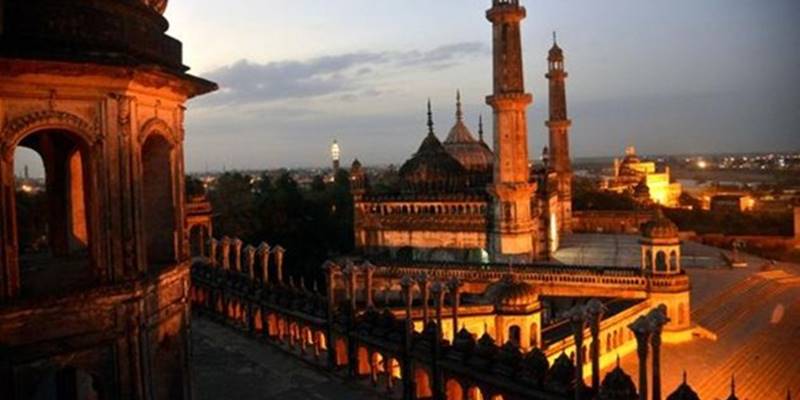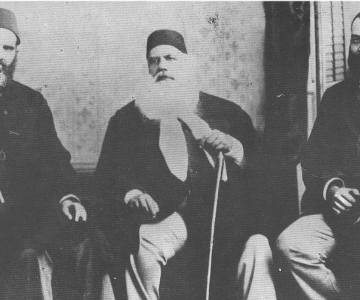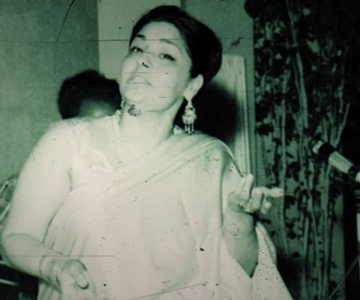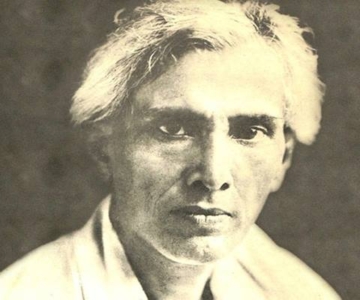By Intizar Husain
ONE fine morning under the programme of Sahitya Academy I found myself in Lucknow, and wondered if it was the Lucknow I had earnestly desired to get a glimpse of. When after partition Attiya Husain wrote her novel depicting the Lucknow of good old days, she chose to present it under the title Sunlight on the broken column. Now the broken column is very much there, but sunlight has long faded away. The novel had been dubbed as decadence by the maulvis, reformists and the progressives alike, and as a flourishing of fine arts and culture by the liberals. Prof Anis Ashfaq, who was kind enough to host me and sensing my keenness to have a glimpse of that sunshine, led me to Imambara Asifiya. What a splendid structure. One was left wondering at high, spacious roof with no columns to support it. The upper story has a bhoolbhulliyan, a maze. It provides added attraction to visitors.
 While coming out of the Imambara I was reminded of the Lucknow adage: Jis ko na dain Maula/ Uss kou dain Asifuddaula (Whom God doesn’t give, Asifuddaula does). It speaks for the generous nawab’s popularity among the masses. And with this building project he also earned the goodwill of Maula as well as of the people, who were happy to get jobs of different kinds because of the project.
While coming out of the Imambara I was reminded of the Lucknow adage: Jis ko na dain Maula/ Uss kou dain Asifuddaula (Whom God doesn’t give, Asifuddaula does). It speaks for the generous nawab’s popularity among the masses. And with this building project he also earned the goodwill of Maula as well as of the people, who were happy to get jobs of different kinds because of the project.
Anis Ashfaq has his own nostalgia with reference to his city. He enumerated the names of a number of distinguished scholars and creative writers, who deserved to be treated as Lucknow ki abroo (pride/honour) but they passed away one by one in recent decades. Talking about Prof Masood Hasan Rizvi in particular he informed me, You have come here at the appropriate moment. Masood Hasan Rizvi seminar hall in Lucknow University is ready for inauguration. We also have a plan for a hall in the name of Prof Syed Ehtsham Husain. He too was associated for long years with this university.
Anis Ashfaq now heads the Urdu department. Accompanied by him I went to the university, cut the tape inaugurating the hall and entered it carrying a short story under my arm. But wait awhile. I should first tell you about my visit to the late scholar’s mansion to see his illustrious son Nayyer Masood, who was not present on this auspicious occasion. He was ill. Anis had forewarned me that we wouldn’t have a long sitting with him. He was not in a position to sit comfortably and talk. And yet we had a long sitting though all the time he appeared feeling uncomfortable.
Nayyer Masood too should be seen as a continuation of those Lukhnavi personalities about whom Anis was talking so nostalgically. He is a scholar marching in the footsteps of his father and also a short story writer. His different scholarly works speak of his deep linkage with the fading Lucknow, while his stories written in symbolic mode of expression are indicative of his modern sensibility.
——————————————————————————–
Coming out of the Imambara I was reminded of the Lucknow adage: Jis ko na dain Maula/ Uss kou dain Asifuddaula (Whom God doesn’t give, Asifuddaula does).——————————————————————————–
Exchanging views with him on certain controversial subjects I felt that like a true scholar he can afford to be dispassionate even on subjects like the controversial book by Dr Giyan Chand Jain, which has divided the Urdu writers in India into two warring camps. By the way, Dr Jain is counted among the most competent scholars of Urdu. But during his last years he wrote a book which triggered off a bitter controversy in India.
Personally speaking, I see no harm in controversies, whether it is an ideologically warfare or a researchers battle. But what is unfortunate is the situation that so often a controversy among us degenerates into personal bickering and charges and counter charges. The same happened in this case. But in the heat of the controversy came the sad news of his death in a distant land. And the controversy came to an abrupt end, perhaps temporarily. So Giyan Chand Jain is no more among us. But his high place as an Urdu scholar remains as it was.
Now coming back to the inaugural function at the Lucknow University, which was presided over by Prof Roop Raikha Verma, ex-vice chancellor, I was sitting in the Masood Hasan Rizvi Semianr Hall sandwiched between two major Hindi writers Mudara Rakshas and Vibhoti Narain Roy. At least the latter should not be an unfamiliar name for readers of fiction in Pakistan as his short novel Shehr Main Curfew has already been translated into Urdu. The novel is a telling portrayal of Muslims in their mohallahs when curfew is imposed on a riot-ridden city. It should be taken as a documentary account of the situation as it is based on the observations of the author in the capacity of a police officer.
So here in the learned gathering of the university I read my story hoping to be received as a better alternative to the formal speech which could be expected on this occasion. It was a sombre function held in a university and so hardly conducive for any kind of heated discussion. Such discussion took place in another function, which had the distinction of being a gathering of Hindiwallas. I found here only one Urdu writer and he was Prof Sharib Radaulvi. It was here that I had to face a volley of questions and a heated discussion with reference to the story I had read at the university.



